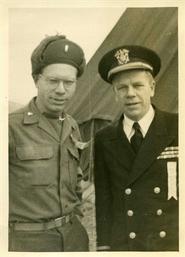
Richard Underwood '51 returned to Hamilton on March 4 to discuss his family's commitment to volunteer work in Korea. He said of his family's legacy, "I used to be very proud of my family, now I am very grateful." In his discussion, Underwood chronicled his own experience with service in Korea as well as the experience of his grandparents, parents and siblings. "Blessed with great parents," he spoke on how his faith in God and belief in service shaped the path of his family's and his own life in Korea.
Underwood began with his grandparents' role with volunteer work, discussing his grandfather's interest in missionary work which he began in 1885 with the opening of the first orphanage in Korea. After becoming friends with the King and Queen of Korea's last dynasty, Underwood's grandfather and grandmother, who was the Queen's physician, became involved with evangelistic work. Underwood's father continued the family tradition of missionary work, going on to become president of a Christian college in Korea.
Underwood chronicled his own history of service in Korea which he credits to his parents. He detailed his personal experience of growing up in Korea, and discussed the period during World War II in which his family was forced to relocate to the United States. After graduating from Hamilton, Richard and his father returned to Korea by serving with the Korean army. He later went on to serve in the Intelligence Sector of Internal Security, and along with his brother, Horace, as an interpreter at the truce negotiations at which he received a bronze star for service. In 1961 Underwood became head of the Seoul Foreign School, under appointment from the Presbyterian Church (USA) as a missionary in Korea.
At the end of the discussion, Underwood ran a slideshow of family pictures in Korea, dating back from his grandparents' time there to pictures of himself during the Korean War. He concluded the talk with a re-telling of the parable of the sower and the seed, comparing his own family to the seed that "lands on good ground, and multiplies."
Richard Underwood's lecture was part of Multi-Cultural Awareness Week during the first week of March, and was sponsored by the Asian Cultural Society (ACS).
-- by Danielle Raulli '10
Underwood began with his grandparents' role with volunteer work, discussing his grandfather's interest in missionary work which he began in 1885 with the opening of the first orphanage in Korea. After becoming friends with the King and Queen of Korea's last dynasty, Underwood's grandfather and grandmother, who was the Queen's physician, became involved with evangelistic work. Underwood's father continued the family tradition of missionary work, going on to become president of a Christian college in Korea.
Underwood chronicled his own history of service in Korea which he credits to his parents. He detailed his personal experience of growing up in Korea, and discussed the period during World War II in which his family was forced to relocate to the United States. After graduating from Hamilton, Richard and his father returned to Korea by serving with the Korean army. He later went on to serve in the Intelligence Sector of Internal Security, and along with his brother, Horace, as an interpreter at the truce negotiations at which he received a bronze star for service. In 1961 Underwood became head of the Seoul Foreign School, under appointment from the Presbyterian Church (USA) as a missionary in Korea.
At the end of the discussion, Underwood ran a slideshow of family pictures in Korea, dating back from his grandparents' time there to pictures of himself during the Korean War. He concluded the talk with a re-telling of the parable of the sower and the seed, comparing his own family to the seed that "lands on good ground, and multiplies."
Richard Underwood's lecture was part of Multi-Cultural Awareness Week during the first week of March, and was sponsored by the Asian Cultural Society (ACS).
-- by Danielle Raulli '10
